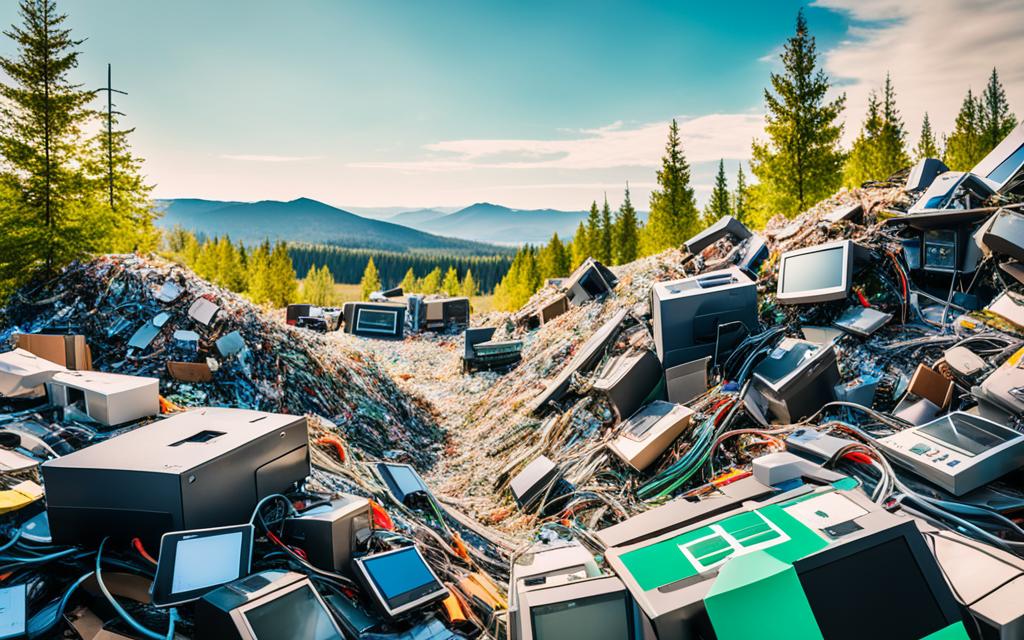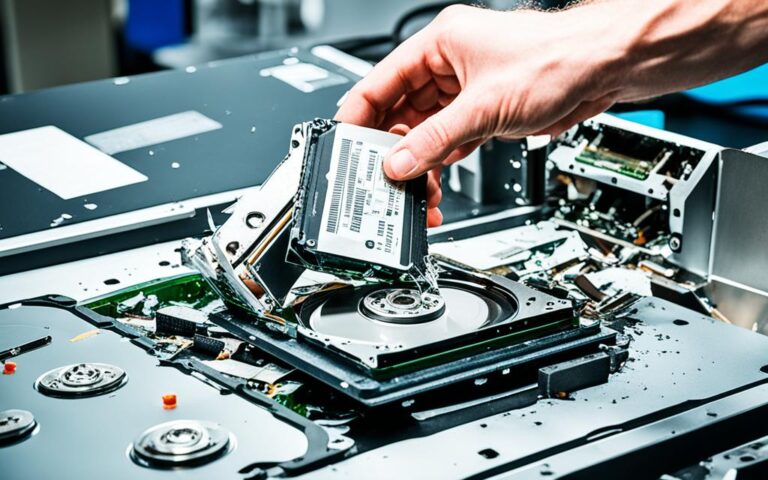Implementing Sustainable Practices in Electronic Data Disposal
Rapid advancement of technology has led to an environmental challenge: electronic waste (e-waste). Sustainable e-waste management is crucial to minimize negative environmental and human health impacts. This article will explore the importance of sustainable e-waste management and provide strategies for creating a greener future.
With the increasing proliferation of electronic devices in our lives, the need for responsible handling and recycling is more pressing than ever. Sustainable data disposal is not only a matter of environmental responsibility but also an integral part of corporate social responsibility. By implementing sustainable practices in electronic waste management, businesses can contribute to a cleaner and healthier world.
In this article, we will delve into the three pillars of sustainable e-waste management—reduce, reuse, and recycle. We will discuss how eco-design and product lifespan play a crucial role in minimizing electronic waste. Additionally, we will explore key strategies for effective e-waste management, including extended producer responsibility, raising awareness, technological innovation, and global cooperation.
Furthermore, we will highlight the benefits of sustainable recycling of WEEE (Waste Electrical and Electronic Equipment) waste on the environment. From implementing a data destruction policy to secure data disposal and recycling, we will discuss how businesses can minimize their carbon footprint and contribute to a circular economy.
Complying with both sustainability and environmental responsibilities is essential. We will explore how a secure recycling service can ensure proper disposal of hard drives while maintaining data security. Additionally, we will discuss the importance of workplace policies that prioritize recycling and proper data destruction.
Integrating sustainable e-waste management into business sustainability strategies is vital. By reducing, reusing, and recycling electronic devices, businesses can not only minimize their environmental impact but also enhance their reputation as responsible corporate citizens.
In conclusion, implementing sustainable practices in electronic data disposal is crucial for safeguarding the environment while ensuring data integrity. By adopting responsible handling and recycling methods, businesses can demonstrate their commitment to corporate social responsibility and contribute to a greener and more sustainable future.
The 3 Pillars of Sustainable E-Waste Management
When it comes to tackling e-waste, three key pillars form the foundation of sustainable management: Reduce, Reuse, and Recycle. Implementing these principles can significantly reduce the environmental impact of electronic devices while promoting a greener future.
Reduce
The first step towards sustainable e-waste management is reducing the consumption of electronic devices. Encouraging consumers to buy fewer products and use them for longer periods helps to minimize waste generation. By extending the lifespan of electronic devices, we can mitigate the need for constant production and disposal, thus reducing the overall environmental footprint. Manufacturers can play a vital role in this process by designing products with longevity in mind and promoting durability.
Reuse
Another crucial aspect of sustainable e-waste management is the practice of reusing electronic devices. Refurbishing and repurposing electronics provides an opportunity to extend their lifespan and prevent them from ending up in landfills. Donating or selling used devices to individuals or organizations in need not only reduces waste but also promotes a more equitable distribution of resources. Embracing the concept of “circular economy,” where products are kept in circulation for as long as possible, is a key component of sustainable e-waste management.
Recycle
Recycling plays a vital role in e-waste management, as it allows for the recovery of valuable materials while minimizing the environmental impact. Recycling facilities dismantle electronic devices and separate their components, ensuring that valuable metals and other resources are extracted and reused. Proper recycling also helps prevent hazardous substances found in electronic devices, such as lead and mercury, from polluting the environment. Recycling initiatives can be further enhanced by implementing eco-design principles, which focus on creating products that are easy to dismantle and recycle.
Key Strategies for Effective E-waste Management
E-waste, with its hazardous materials, poses a significant threat to the environment when not managed properly. Implementing key strategies is vital to combat this global issue and create a sustainable future.
1. Extended Producer Responsibility (EPR) Initiatives
Extended Producer Responsibility (EPR) initiatives play a crucial role in holding manufacturers accountable for the entire lifecycle of their products. By encouraging responsible manufacturing practices and incorporating measures for proper disposal and recycling, EPR aims to minimize the environmental impact of electronic devices.
2. Raising Awareness and Education
Raising awareness and educating the public about the detrimental effects of e-waste is essential in driving sustainable change. Through informative campaigns and educational programs, individuals and communities can gain a deeper understanding of the environmental consequences of inadequate e-waste management.
3. Technology Innovation
Technological innovations empower us to develop robust solutions for effective e-waste management. Blockchain technology, for instance, can revolutionize the tracking and tracing of e-waste, enhancing transparency and accountability throughout the disposal and recycling processes.
4. Global Cooperation and Policy Advocacy
Addressing the e-waste challenge necessitates global cooperation and policy advocacy. Collaboration between governments, organizations, and stakeholders is crucial in establishing comprehensive regulations that promote responsible e-waste management practices worldwide.
Impact of e-waste
| Type of Impact | Description |
|---|---|
| Environmental | The improper disposal of e-waste contaminates soil, water, and air, leading to eco-system destruction and harmful effects on flora and fauna. |
| Health | Exposure to e-waste toxins can result in severe health issues, including respiratory problems, cancer, and neurological disorders. |
| Economic | Unmanaged e-waste depletes valuable resources and hinders economic growth potential through the loss of reusable components and precious metals. |
E-waste management is a multidimensional challenge that demands the collaboration of individuals, industries, and governments worldwide. By implementing key strategies, we can mitigate the impact of e-waste, foster sustainable practices, and preserve our planet for future generations.
Benefits of Sustainable Recycling of WEEE waste on the environment
When it comes to electronic waste (WEEE waste) management, implementing a data destruction policy is crucial for businesses aiming to reduce their environmental impact. Improper disposal of hard drives can have detrimental consequences due to the hazardous materials they contain. Securely destroying and recycling hard drives not only ensures data compliance but also demonstrates environmental responsibility.
By recycling and repurposing hard drives, businesses can significantly contribute to waste reduction and the conservation of natural resources. This sustainable approach minimizes the need for raw material extraction and reduces the overall carbon footprint associated with electronic waste. Embracing secure recycling services enables organizations to align their operations with eco-friendly practices, protecting the environment and promoting a more sustainable future.
Benefits of Sustainable Recycling of WEEE waste:
| Benefits | Description |
|---|---|
| Environmental Preservation | By recycling hard drives, businesses contribute to reducing waste and preventing hazardous materials from entering landfills or harming ecosystems. |
| Conservation of Natural Resources | Repurposing and recycling hard drives decreases the demand for raw materials, conserving valuable resources and reducing the carbon footprint associated with extraction and manufacturing processes. |
| Data Compliance | Secure data disposal through recycling ensures compliance with data protection regulations, safeguarding sensitive information and mitigating potential data breaches. |
| Circular Economy | Recycling and repurposing hard drives contribute to a circular economy, where materials are reused instead of discarded, promoting sustainable production and consumption practices. |
“Sustainable recycling of WEEE waste not only benefits the environment but also aligns businesses with responsible corporate practices, helping create a greener and more sustainable future.”
By prioritizing secure data disposal and investing in secure recycling services, businesses can demonstrate their commitment to environmental responsibility while promoting data compliance.
Comply with both sustainability and environmental responsibilities
When it comes to sustainable e-waste management, businesses must prioritize not only environmental responsibility but also data security. Implementing a secure recycling service ensures the proper disposal of hard drives while safeguarding sensitive information.
To ensure data security, hard drives can be shredded into small pieces, effectively destroying the data and materials they contain. This method eliminates the risk of data breaches or unauthorized access.
Furthermore, recycling metals from hard drives contributes to a circular economy, reducing the need for extracting raw materials. This sustainable approach helps conserve natural resources and minimizes the environmental impact of mining and extraction processes.
In order to prioritize recycling and align with both sustainability and environmental responsibilities, businesses can implement workplace policies that encourage the proper disposal and recycling of electronic waste. These policies ensure that employees understand the importance of disposing of their electronic devices in an environmentally responsible manner.
By integrating security policies, recycliimg src=”https://seowriting.ai/32_6.png” alt=”privacy regulations”>
| Data Security | Environmental Responsibility |
|---|---|
| Shredding hard drives into small pieces | Recycling metals from hard drives |
| Prevents data breaches | Reduces the need for extracting raw materials |
| Protects sensitive information | Contributes to a circular economy |
Adopt policies that prioritize recycling
Businesses need to establish robust workplace policies that prioritize secure data destruction and recycling to enhance data security, particularly in remote and hybrid working environments. Implementing such policies not only minimizes the environmental impact of e-waste but also ensures the responsible handling and disposal of sensitive data.
“Implementing workplace policies that prioritize recycling and data security is crucial for modern businesses. It not only safeguards the environment but also protects valuable information from falling into the wrong hands.”
To assist companies in adopting workplace recycling policies and navigating compliance requirements, Shred-it offers comprehensive expertise in maximizing data security. With their secure recycling services, businesses can safely dispose of hard drives while staying compliant with privacy regulations and industry standards.
Importance of Sustainable E-waste Management in Business Sustainability Strategy
Sustainable e-waste management is a critical aspect of any business sustainability strategy. By implementing effective e-waste management practices, businesses can contribute to waste reduction, resource conservation, and the reduction of their carbon footprint.
One of the key ways businesses can achieve sustainability is by reducing electronic waste. Purchasing fewer electronic devices and extending the lifespan of existing ones through proper maintenance and repair can significantly reduce waste generation. This approach, known as waste reduction, helps conserve valuable resources and energy used in the manufacturing process.
Another important strategy is the concept of reusing electronic devices. By refurbishing and repurposing old electronics, businesses can give these devices a second life and provide them to individuals or organizations in need. This not only reduces waste but also helps bridge the digital divide, ensuring access to technology for all.
“Sustainable e-waste management is essential in minimizing environmental impact and ensuring a greener future.”
Recycling is a vital component of sustainable e-waste management. Proper recycling of electronic devices allows for the recovery of valuable materials such as precious metals, plastics, and glass. By recycling these materials, businesses can reduce their reliance on mining for raw materials, thus conserving natural resources and reducing the environmental impact associated with extraction.
Innovative Approaches to E-waste Management
Collaboration, innovation, and global cooperation are key to addressing the e-waste challenge comprehensively. Businesses can work together with governments, non-profit organizations, and technology providers to develop innovative solutions for e-waste management.
One such innovative approach is the use of blockchain technology to improve the tracking and tracing of e-waste throughout its lifecycle. This technology can provide transparency and accountability, ensuring that e-waste is handled and recycled responsibly.
Benefits of Sustainable E-waste Management
The benefits of implementing sustainable e-waste management practices in business sustainability strategies are multifaceted. Not only does it contribute to waste reduction and resource conservation, but it also helps businesses minimize their carbon footprint.
Reducing e-waste through waste reduction and reuse practices helps conserve resources, reduce energy consumption, and minimize greenhouse gas emissions associated with the manufacturing, transportation, and disposal of electronic devices.
Furthermore, proper recycling of electronic devices prevents the release of hazardous materials into the environment, protecting ecosystems and human health. It also supports the circular economy by recovering valuable materials and reducing the need for extracting new resources.
| Benefits of Sustainable E-waste Management | |
|---|---|
| 1 | Reduces waste generation |
| 2 | Conserves valuable resources |
| 3 | Minimizes carbon footprint |
| 4 | Prevents the release of hazardous materials into the environment |
| 5 | Supports the circular economy |
Conclusion
Sustainable data disposal is a critical component of environmental responsibility in the face of mounting electronic waste. To ensure a greener future, businesses must embrace the three pillars of sustainable e-waste management: reduce, reuse, and recycle. By implementing key strategies and prioritizing recycling in workplace policies, companies can minimize their environmental impact and contribute to a more sustainable world.
Effective electronic waste management starts with reducing consumption and extending the lifespan of electronic devices through eco-design. Reusing and repurposing electronics whenever possible further minimizes waste. Recycling, on the other hand, ensures the recovery of valuable materials and prevents them from entering landfills.
It is crucial for businesses to recognize their role in sustainable e-waste management and take proactive measures to address it. By adopting workplace policies that prioritize secure hard drive destruction and recycling, companies can safeguard the environment while maintaining data integrity. Sustainable data disposal is not only an environmental responsibility but also a necessary step towards building a more sustainable future.
FAQ
What is the most effective way to tackle e-waste?
The most effective way to tackle e-waste is through reduction, encouraging consumers to buy less and use electronic devices longer.
How can eco-design contribute to sustainable e-waste management?
Eco-design and developing products that are easy to disassemble, repair, and upgrade can prolong their lifespan and reduce e-waste.
What is the importance of reuse in e-waste management?
Reuse is another sustainable approach, refurbishing and repurposing electronics for individuals or organizations in need, thereby reducing waste.
Why is recycling vital for e-waste management?
Recycling is vital for recovering valuable materials from e-waste and minimizing its environmental impact.
What are Extended Producer Responsibility (EPR) initiatives?
EPR initiatives hold manufacturers accountable for the entire lifecycle of their products, including proper e-waste management.
How can raising awareness about e-waste impact management?
Raising awareness and educating the public about the environmental impact of e-waste is essential for promoting sustainable management practices.
How can technology innovation improve e-waste management?
Technological innovations such as blockchain can improve tracking and tracing of e-waste, enhancing transparency and accountability in the process.
Why is global cooperation important for e-waste management?
Collaboration and policy advocacy at a global level are important for comprehensive e-waste management, ensuring a coordinated and effective approach.
Why is implementing a data destruction policy crucial?
Implementing a data destruction policy is important to reduce environmental impact and ensure data compliance and security.
How does secure hard drive destruction contribute to environmental responsibility?
Secure hard drive destruction and recycling ensure proper disposal of hard drives without compromising data security, reducing waste and conserving natural resources.
How can businesses prioritize recycling of hard drives?
Businesses can prioritize recycling by implementing workplace policies that promote secure hard drive destruction and recycling.
Why is sustainable e-waste management crucial for business sustainability strategies?
Sustainable e-waste management helps businesses minimize waste, conserve resources, and reduce their carbon footprint, aligning with their sustainability goals.
Why is sustainable data disposal essential?
Sustainable data disposal safeguards the environment while ensuring data integrity, allowing businesses to fulfill their environmental and data security responsibilities.













